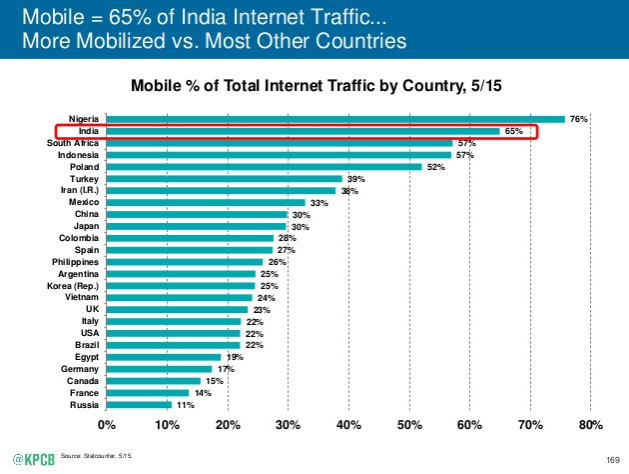“Mobile is the future, scratch that. Mobile isn’t the future, it is the primary screen.”
The above quote sounds all too familiar, it is now cliché.
In Africa, the millennial have leapfrogged the desktop paradigm straight to mobile. In a world where social media have been so woven into our social fabric, it is no surprise why these medium has become too important to be ignored. This, by no means, isn't an African thing alone. It seems to be a recurring decimal in the emerging markets with countries like China, India and Brazil scoring 21%, 55% and 28% respectively in new smart phone subscription.
In May this year, Mary Meeker, a Morgan Stanley analyst turned venture capitalist at KPCB (Kleiner Perkins Caufield & Byers), further underscored this phenomenon when she pointed out that Nigeria is the most Internet mobilized country in the world with a staggering 76% Internet mobility with India and China trialling behind her.

Nigeria is leading.
I've always held this proposition close to mind but I haven't quite grappled with its scale until recently. One of the products I very much care about is the Konga community. It is my baby. I popped open Google Analytics to see what was happening, I looked at every metrics and indicator available but one metric did catch my attention. Mobile. Mobile is killing it and it seems nothing can hold it back, not surprising though, but what particularly caught my attention was the fact that the mobile to desktop ratio was a staggering 63:38%. Now that's outstanding.

Ratio of mobile to desktop users
Nigeria is a country of over 170M people with well over 140M mobile subscription, while all of these may not necessarily be smart phones, 16% of these mobile subscriptions are indeed...smart phones.
Nigeria, according to Wikipedia has well over 60M Internet users and the vast majority of these users are smart phone users. Going back to my earlier numbers with regards to the mobile to desktop ratio, it isn't any surprise while mobile reign supreme and will continue to do so.
These numbers however, goes to show why mobile should be taken seriously. In Africa and other emerging market, mobile isn't dessert. It is the main course
Consideration when building for mobile:
- The vast majority of the mobile users in Africa and Nigeria in particular are still on the 2.5G network, very few MNO(Mobile Network Operators) offer full 3G coverage nationwide. So when building keep speed at the back of your mind.
- Mobile data is still expensive. 1GB data bundle retails for about $15 with a 30 days validity. So the less graphics and videos your users will have to deal with, the better UX you will be providing.
- Graceful degradation should be at the core of your product development. Asking users to choose a mobile view while using your website just wouldn't cut it again. It should come naturally. Frameworks like Bootstrap and Foundation already handle the bulk of the work for you.
- Keep the call to action simple. Less clicks means less frustration. On the community for instance, you only have to tap one single button in order to start a conversation.
- Make it magical. The vast majority of users that will be onboarded into this age(web and Internet) will come through messaging apps. There is a reason WhatsApp exploded, it just works. Simple.
What does the future truly hold? I see a future where desktops would be used only in corporate institutions. Everything will be done via mobile; shopping, banking, bills payment. Virtually everything.
Any sufficiently advanced technology is indistinguishable from magic.
Authur C. Clarke
I'll love to hear from you
Do you want to say hello? Email me - celestineomin@gmail.com
I tweet at @cyberomin
If you enjoyed this post, please consider sharing it. comments powered by Disqus